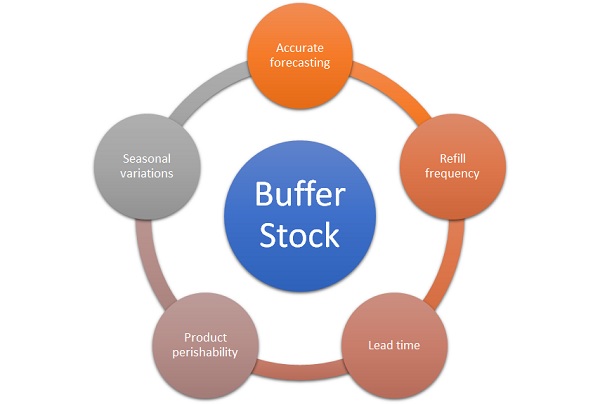- Business Concepts ›
- Operations and Supply Chain ›
- Buffer Stock
Buffer Stock
Definition, Importance, Parameters & Example
This article covers meaning & overview of Buffer Stock from operations perspective.
What is meant by Buffer Stock?
Buffer stock is an additionally stored volume of goods which is kept to meet any sudden future demand or supply fluctuations. It is a backup stock, which retains some kind of buffer to protect in case of uncertain future. Buffer stock is kept as an extra backup to prepare for any uncertain business situations.
Buffer stock is also known as strategic stock or safety stock or buffer inventory. It is an important aspect in inventory management.
Importance of Buffer Stock
Buffer stock may be found at all stages of the supply chain, and is intended to reduce the occurrence or severity of stock-out situations and thus provide better line continuity and/ or customer service. Buffer stock is used in production or other inventory situations to ensure that exceptional or unpredictable shortages or demands can be met with some degree of certainty. Safety stock is generally held when there is uncertainty in the demand level or lead time for the product.
The amount of buffer stock a business chooses to maintain regularly can dramatically affect their operations.
Too much stock can result in high inventory carrying costs. Too less stock can cause repeated occurrences of stock-outs. Hence, businesses need to maintain a fine balance and decide on the amount of buffer inventory to be held.

Read More
5 Buffer Stock Parameters
Some of the key parameters of having a safety stock are:
1. Accurate forecasting
It is very important for knowing the buffer stock. Forecasting regarding demand & supply can help evaluate volumes which would be required for buffer.
2. Refill frequency
The trends and past frequency of refilling can help in order to replenish the stock. The frequency e.g. once a month can help a company plan better.
3. Lead time
Lead time is the period it will take for company to produce a quantity of stock.
For planning buffer stock, it has to be in sync with the lead time else either stocking would be delayed or it would be earlier than expected.
4. Product perishability
Shelf lives or perishability of the goods is a very important parameter for buffer stock planning.
5. Seasonal variations
Seasonal variations also need to be considered by storing buffer stock.
The product may sell more in summers as compared to winters or vice versa so buffer stock cannot be same for both seasons.
Advantages of Buffer Stock
1. Prevention from demand-supply fluctuations
2. Can result in stable revenue generation
3. By having buffer stock, opportunity losses do not occur
Disadvantages of Buffer Stock
1. In case of shorter shelf life, the products can get damaged and be rendered useless.
2. Additional overhead costs in purchasing and storing this stock.
Buffer Stock Example
Let us take an example of a restaurant which makes Pizzas. It needs flour, cheese, tomatoes, onions for its production. Now let us see the 5 parameters we saw earlier. There can be changes in demand of Pizza over the year or a month. The demand of Pizza can go up on weekends and holidays as compared to other weekdays. So the owner plans to have buffer stock planned to meet weekend demand for Pizza.
Now the ingredients above are all perishable so they can't be stocked more than they can be used before getting spoilt. Also it can happen that in a particular season tomatoes and onions are not available easily and also demand for Pizza in a particular season is low. Both these would be considered by the owner of the restaurant before piling up buffer stock. Also the owner needs to see the past trends and refill frequency to stock the ingredients to meet the demand and run the restaurant smoothly.
Hence, this concludes the definition of Buffer Stock along with its overview.
This article has been researched & authored by the Business Concepts Team which comprises of MBA students, management professionals, and industry experts. It has been reviewed & published by the MBA Skool Team. The content on MBA Skool has been created for educational & academic purpose only.
Browse the definition and meaning of more similar terms. The Management Dictionary covers over 1800 business concepts from 5 categories.
Continue Reading:
What is MBA Skool?About Us
MBA Skool is a Knowledge Resource for Management Students, Aspirants & Professionals.
Business Courses
Quizzes & Skills
Quizzes test your expertise in business and Skill tests evaluate your management traits
Related Content
All Business Sections
Write for Us